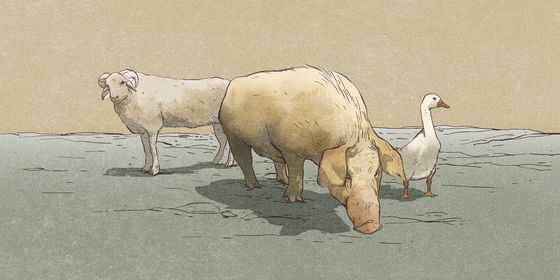Ever feel like your employees are keeping a secret from you?
Author: Kang Fu 康夫
Kang Fu graduated from Tsinghua University and has studied in Israel. Once a prolific traveler, she now spends most of her time at home as “an unknown screenwriter, idler, and author of unprofitable books, loving monster legends and food.” She has published The Jobless Journey based on her travels, and a novel, The Gray Cat Curiosities Agency.
The other day, talking to some people familiar with the food and beverage industry, I heard an amusing story.
There was a Mr. Song who opened a chain of fast food restaurants, mainly catering to white-collar workers. In this business, the earnings are stable, but the barrier to entry isn’t high, so competition is fierce. Aside from ingredients, sanitation, and taste, improving the table turnover rate was the real nut to crack. Song hadn’t been in the business long, but he was already somewhat well-known in the industry, mainly because of his impressive turnover rate.
“You know, since fast food restaurants are small, we can’t afford a large dishwashing machine; plus, it takes too long to do a load. It’s not suitable to our turnover rate. You can buy more dishes, but you’d have to find a place to store them, so those of us in the business have to hire dishwashing employees. Still, it’s hard to find one who works hard and has the skills.”
Song was reclining in a lounge chair at a resort, enjoying an iced coconut and chatting with a Mr. Li. Li was an internet guy and entrepreneur. After doing breakfast burritos, nail salons, takeout, and beef brisket noodles, he’d gone into fresh-squeezed fruit juice. His brand got a lot of hype, but the customer experience left something to be desired. Market research showed that it was because wait times were too long. Li had heard about Song’s miraculous turnover rate, and came to seek his advice.
“In order to ensure freshness and cleanliness, we wash the fruit on-site, after a customer places an order. One cup of juice requires a bunch of different fruits that must each be washed, cut, and squeezed, which is why it takes so long. Our customers are annoyed, but we can’t install an industrial dishwasher in a mall!” Li was fretting.
“So what you need are suitable workers to do the washing,” Song paused meaningfully.
Li saw his opening. Coconut in hand, he scooted closer to Song’s chair, begging, “Tell me your secret.” When Song didn’t make a move, he added, “If you tell me, you can name your price; I’ll write out a contract and wire you the money right away.”
Song’s face creased into a smile: “Ai-ya, look how serious you are, how could I charge you? We were at Yellow River Business College together! Anything you want to know, I’ll be sure to tell.”
It turned out that Song had grappled with the same problem for a long time. He’d tried a number of different solutions, such as washing the dishes himself, giving out bonuses, and even training his own team. Nothing worked. The reason was simple: dishwashing wasn’t a job with much room for advancement, and most who took it up had just come to the city and needed a springboard to a better job. Nobody was trying to make a career out of this, and so nobody took it seriously, nor wanted to be trained. “If only I could find someone who really loves dishwashing,” thought Song, but where would someone like that be found?
He tacked up a sign in the window of the restaurant that remained there for a long time: “DISHWASHERS WANTED. ROOM AND BOARD. HIGH SALARY.” But the dishwasher of his dreams never showed up.
One day in the fall, Song was going over the accounts in the restaurant. A man of average height and a round face hesitantly entered the store. Song thought he was there to eat, and was about to tell him that the restaurant was closed for the afternoon and would re-open at 5, when the round-faced man pointed at the faded sign, and timidly asked: “Are you still hiring?”
Song picked out a rural accent in the man’s voice, and figured he hadn’t been in the city long.
“What can you do?” Song asked.
“Wash dishes,” the man replied.
“Lots of people can wash dishes,” Song rejoined.
“I can only wash dishes,” said the man.
This got Song’s attention. He looked the man over. He wasn’t thin or fat, and looked quite nimble and spry. His messy hair and large ears stuck out. His eyes were big and round, with prominent dark circles around them; maybe he was not getting enough sleep? The weather was quite warm, yet the man was dressed in a dull brownish-gray sweater, with a black-and-white striped scarf around his neck.
“You can only wash dishes? What does that mean?” Song scrutinized the potential hire.
“What I mean is, I’m really happy washing dishes; it energizes me. I can do it quickly and do it well; nothing else does it for me like washing dishes.”
“For real?” Song was shocked. “There’s someone who loves washing dishes?”
“Absolutely!” the man replied earnestly. “When I see dishes in the sink, my hands itch. If I go a day without washing dishes, I feel empty.”
“I find that a bit hard to believe. Why don’t you try it for a day first?” Song said.
The dinner rush soon started, and Song led the man into the back kitchen. Customers poured in, and a steady stream of bowls flowed back. The new dishwasher’s eyes lit up; he rolled up his sleeves, and got to work—hands flying, water splashing. He’d pick up a bowl and washcloth, spin the bowl around, and let soapy foam form a whirlpool in the sink. Soon, a pile of freshly cleaned bowls was assembled to the side. Song and the other employees watched in awe, almost forgetting to prepare the food as the dishwasher deftly whipped his cloth.
More and more customers came, and dishes streamed into the back kitchen. Normally, at this time, the washing station employees would be complaining that they’d never get through this mountain of unwashed bowls, and some bowls might even be broken in the chaos. Under the new dishwasher, though, the bowls almost didn’t have enough time to pile up.
When the restaurant closed for the day, Song asked the worker to stay behind.
“Have you worked in a restaurant before?” Song asked.
“No,” he said.
“What are you looking for in terms of salary?” Song was running numbers in his head.
“Doesn’t matter. Just room and board, and fruit to eat.”
Song’s heart skipped a beat, and he felt uneasy. Going around, looking for work and a place to crash, not even wanting money—wasn’t that just like the fugitives they showed on the news?
“Where are you from? What’s your surname?” Song asked cautiously.
“My name is Xiong. I’m from the mountains.” It didn’t seem like he was lying.
Song took another look at the man. He wanted to ask for the man’s ID, but then, even if the man showed it to him, it was probably fake. Might as well just leave it, he figured.
Thinking it over, he decided to take the man on, and brought him to the workers’ dormitory. As they arrived at the bunk, Song saw Xiong open the small backpack he carried. Aside from a change of clothes, it was empty except for a few apples.
“All right, then, you’re on; I’ll make sure you’re paid,” said Song.
“Don’t forget the fruit, I need those,” said Xiong. “I’m vegetarian; I have to have fruit at every meal.”
That was a bit of a pain, Song thought, but he didn’t bother to reason with the man. He arranged to have some fruit brought in specially for Xiong every day with the supplies.
In the following two months, there were no flaws in Xiong’s performance. No matter how many customers came in, the kitchen operated smoothly. Xiong worked with deftness and ease. The table turnover rate skyrocketed, and Song was in great spirits. There was just one small problem: The other staff who bunked with Xiong complained that he was constantly eating fruit whenever he wasn’t working; all throughout the night, they could hear him crunching and gnawing, making it impossible to sleep. Song felt there was no way he’d get rid of Xiong; in fact, if he could find another one like him, he would fire all those other whiners.
Song paused at this point in his story, and took a few big sips from the coconut. Li was completely entranced.
“So was this guy not human or something?” Li asked.
“You guessed it,” said Li. “We suspected from the start.”
“So then what happened?” Li asked.
“Well, I got more and more curious, but I didn’t want to ask directly, so I thought up something—detective work.”
Businessmen are a superstitious lot, and all kinds of feng shui “masters” plied their trade in the city. Song was no exception, and had the number of a “Master Wise Eyes” saved in his phone. Bringing along with an old and valuable cake of Pu’er tea, he went to the master and briefed him of the situation. “I can take care of this,” the master smiled. “I already know what to do. At the start of next month, invite me to your restaurant under the pretext of inspecting the feng shui. When I come to the kitchen, just subtly point the worker out to me and, using my magic mirror, I’ll be able to find out what kind of spirit it is.”
Song was overjoyed. He required, though, that the master simply tell him what Xiong was, not drive him away. A worker like this was very hard to find. He didn’t want to mess with a good thing.
Soon the master came by according to plan, making a show of doing a feng shui inspection. As the restaurant filled up, he remarked: “Oh, I forgot to inspect the kitchen. Such an important place deserves a good look-over.”
The master went into the back kitchen and saw a man with messy hair working hard at the washing station, intent upon his task. As the master crept behind the man, he whipped out a mirror from his robes and pointed it at the dishwasher. Song’s heart was beating like a drum. If Xiong’s true likeness was revealed, the customers might be terrified; and if the dishwasher was really a spirit, then was he good or evil? Seeing the master’s eyes grow wide with shock, Song leaned over to look, his heart pounding, his throat tight—
The creature in the mirror wasn’t a ferocious beast, but neither was it the same dishwasher as before. It was furry, round-bodied animal with small limbs, a gray body, and dark circles around its eyes. A black-and-white striped tail grew out of its body. As Song stood there, the master calmly put away his mirror, and continued with the inspection. The two of them quickly exited the room.
“So, what is it?” Song demanded.
The master chuckled. “You haven’t seen one before?”
“I think I might have, but I can’t think of what it’s called.”
The master was roaring with laughter: “Something that loves washing, and eats fruit for every meal? Come on, man. A raccoon!” 1
Song was hit by realization. “A freaking raccoon!”
The master spoke: “That’s right. Aside from a raccoon, who else would love washing dishes? See, this is why he’s so good at his job.”
Song’s astonishment turned to joy: “So then there’s nothing to worry about? No danger in keeping him around?”
“Relax, these animals are gentle. As long as they have enough food and sleep, there’s nothing to worry about. However, you do need to be careful: They hate oath-breakers. If someone promises something and goes back on their word, it would be disastrous.”
At this point, Song paused his story again, looked at Li, who was deep in awe, then continued.
That day after the master left, Song was in great spirits. He bought a basket of fruit and went to talk with Xiong. Actually, he just asked a single question: “Mr. Bear, I see that you’re quite good at this job. I guess everyone from your hometown is. Could you find some friends from home to come work here?”
Xiong agreed, and took a trip home. Soon, he returned with a few village mates who all looked and sounded like him. Song prepared all kinds of fresh fruit and received the new workers warmly. He didn’t ask where they came from. On the second day, he laid off all the other dishwashers and brought in Xiong’s people. There were no more complaints from the dormitory. They all lived together; they ate fruit whenever they wanted.
After this, the efficiency of the kitchen skyrocketed, and the business became better and better. Song saved up money to expand, and soon investors were coming by, wanting to finance a chain. That was all thanks to his efficient raccoon staff. People couldn’t figure out how his restaurants could have such quick table turnover and low labor costs.
Li looked at Song with admiration as he finished his story. “I had to put so much effort into convincing my backers, whereas you didn’t have to do anything; they came knocking on your door!”
“I don’t have superpowers,” said Song. “Raccoons are auspicious animals; gods of wealth. They brought all the good luck to my restaurants.”
Li was totally converted.
“Now, it’s only because we were classmates that I’ve told you my secret,” Song reminded him, tapping the now-empty coconut.
Li nodded. “I know, I know, I won’t tell anyone.” He hesitated for a second before changing his tone to ask Song. “You know, if I could also hire some of these raccoons to wash fruit, I wouldn’t have to worry about annoyed customers anymore. Song, could you, uh, have your raccoons introduce some employees to me?”
Song looked at him with an enigmatic smile, and Li added quickly and apologetically: “Song, please don’t misunderstand, I won’t steal your employees. I’m just saying, raccoons might also suffer from unemployment problems, so if we provide good jobs and good salaries, we can lift them out of poverty, and we’d be doing a good thing…”
Song waved his hand, cutting him off. “You’re overthinking it. I’m willing to help you. However, it would help if you could do the raccoons a little favor.”
“What is it? Tell me!” Li beat his chest with confidence.
“Well, you make fresh fruit juice, so you have your own supplier, right? I hear that it’s all imported, and organic?”
“Of course, we have a great supplier who brings in new stock every day. It’s all Grade-A stuff. It’s hard to find on the market here, even if you have the money to pay for it!” Li declared proudly.
“Great. OK, well I have so many raccoons at my place, and they just burn through fruit like crazy every day. I do fast food, I don’t understand fruit, and I don’t have a suitable supplier. Can you go to your supplier and order a year’s supply of fruit? Pay in advance, and have them deliver it every day to us. The money for the fruit you can consider my headhunting fee.”
Li was a bit taken aback; he hadn’t expected this kind of request. The cost for a year’s supply of fruit wasn’t small, although compared with his urgent needs, it wasn’t much. It was the investors’ money after all. Plus, if he didn’t improve the quality of his customers’ experience, the investors might back out. Thinking it over, he saw what was his priorities were, and said firmly, “No problem. It’s done.”
Song kept his word. When he saw the invoice from the fruit company and got the first delivery, he immediately sent a few dishwashers over to Li—no, fruit-washers. These new employees were featured in Li’s new advertising campaign: “Freshly washed and squeezed, cleanliness you can see.”
As night fell and business slowed down, Song closed his restaurant. A group of raccoons gathered around the table, waiting for Song to bring the fruit. Their eyes were round with hunger.
“This imported fruit is great!” The raccoons held the fruit in both paws, burying their faces in it, letting out sounds of joy.
“I didn’t think Boss Song’s trick would work. Humans are really easy to fool,” said one. “Still, won’t they soon find out that we can’t wash fruit?”
Thinking of the plump fruits rolling about in their stubby claws, the raccoons all guffawed.
“One of the guys they sent over is Claws Joe, from the same part of the forest as me; his arms are so short he can’t even wipe his butt. How’s he supposed to go wash fruit?” said another raccoon, making all of them laugh again.
“Who cares after they find out?” Song spoke up. “He’s not going to admit to anyone that he hired raccoons. He’s already paid for a year of fruit, so we’re covered for the year.” He no longer looked like the Mr. Song who had shared a lounge chair with Li. He’d taken off his suit and shirt, changed into a dull brownish-gray sweater, and wrapped a black-and-white striped scarf around his neck; all of a sudden, he was a raccoon again, albeit one with an air of authority, with some real raccoon gravitas.
“I gotta ask, Boss, how did you think this up?” one raccoon slurred, his mouth full of apple.
“Ah, just a little trick from business school. Present yourself, dangle profits, wipe away worries, and 80 or 90 percent of people will take the bait,” another raccoon answered on Song’s behalf. “Humans only think about getting rich. They don’t understand that the sweets you tricked someone out of always taste sweeter.”
“But what if Li finds out that the guys we sent over can’t wash fruit? What if he takes our stuff back?” asked the previous raccoon.
“No way.” Song chuckled. “You missed a little trick I threw in when telling my story. I made it clear to Li that the feng shui master said raccoons hate those who break promises, and will be sure to retaliate. I’m sure Li wouldn’t take that risk. Relax and enjoy the fruit.”
“Speaking of which, what are we going to do after the year’s up?” a young raccoon was worried.
The large raccoon next to him swatted his head. “Quit worrying. In a year, we’ll just find another way to trick humans.”
Just like that, all the raccoons’ worries were gone. They lowered their heads and tucked in. The room was soon filled with the delicious fragrance of fruit, and the festive sounds of crunching and slurping rose in the air.
– Translated by Moy Hau (梅皓)
Author’s Note: I hesitated to write about these raccoons—I didn’t want to reveal their secret to the public. My roommate disagreed: “People would be happy to know there were such animals among them. Many people are unhappy about living in a world of humans.” Our cat didn’t object, either. “Just don’t give away too much,” it instructed, licking its chops. “If these stories make money, I can get better food to eat.”
Fiction: Help Wanted is a story from our issue, “China Chic.” To read the entire issue, become a subscriber and receive the full magazine.












